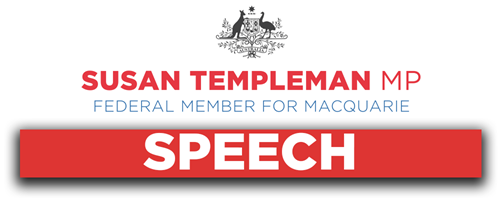
I'm very pleased to support this motion by the member for Newcastle. I think there's a reason, when you look around at my colleagues on the government benches, that you see so many women sitting there—it's 53 per cent, in fact, across our caucus—and it's that Labor does care about gender equality. We care about women's economic stability, and closing the wage gap will always be a focus for us. Of course, the more that women are represented on our side of politics, on the crossbenches and, hopefully, in the opposition, the deeper the commitment and the understanding of the complexities that affect women's employment and earnings should be.
While no-one thinks we can flick a switch and end the gender pay gap overnight, we can already see the actions of the Albanese Labor government having a real effect. The latest Global gender gap report from the World Economic Forum shows that Australia's world gender equality ranking jumped 17 places from 43 to 26, and that's in our first year of government. It's the biggest improvement since the index was created in 2006, and it means our nation is back on track, working towards ending the gender pay gap, which still sits at around 13 per cent.
Now, in practical terms, on average, an Australian woman working full time earns $253.50 per week less than a man working full time. This pay gap persists across all industries. The level of employment of women in fulltime jobs has improved in the last year. The latest Bureau of Statistics employment figures show good progress for women, with 54 per cent of the new full-time jobs in the year to July being for women, leading to 228,600 more women working full time. Now, that's some of the strongest jobs growth that we've seen, and across the board, in fact, unemployment is at a historic low. In New South Wales it's got a '2' in front of it—2.9 per cent —for the first time in recorded history.
If that is creating more opportunities for women to have secure, full-time work, that is a good consequence, but we know that there are many doing casual and gig economy work where loopholes mean they're being undercut on their wages. So, while we're pleased with the progress we've made over the past year or so, we know it's not good enough. There is no excuse to justify women being paid less than men. Closing the gender pay gap and increasing women's participation in the workforce has been at the heart of our election promises and our actions in government. We've expanded paid parental leave by committing $346 million over five years to combine paid parental leave and dad-and-partner pay into one scheme. This will better support dads and second parents to share the parental leave payments. Recently, a mum who earns more than her husband expressed her thanks for the changes that we've made. She said that it means that, where a family income limit of $350,000 is applied, she can now have paid parental leave rather than it being based on her income alone. It's worth noting that we've also expanded employees entitlement to unpaid parental leave from six weeks to 20 weeks so that families can share work and caring responsibilities more easily. These are making a real difference on the ground for people.
Our cheaper childcare policy is another way we're trying to tackle that pay gap. Earlier this month, our cheaper child care came into effect, designed to make it cheaper for around 6,000 families in Macquarie and to increase women's participation in the workforce. It's not fixing the problem in one go, but it is the start of our commitment to improving childcare access and cost. We have the Productivity Commission on the case to look at how we can improve affordability and access for the long term. We want to see how we can make sure that we've got a universal early education system so every child gets a great start in life.
Lack of flexible working arrangements was flagged as a key barrier to women's workforce participation at our
Jobs and Skills Summit last September. Women still do a larger proportion of unpaid caring work and are twice as likely to request flexible working arrangements. Unsupportive workplaces can lead to them taking lower-paid, less-senior positions and less-secure work. Our 'secure jobs, better pay' legislation has delivered stronger access to flexible working arrangements. Employers and employees must now come together. This, along with things like lifting the barriers for bargaining, means that we're making a difference in that gender pay gap.


